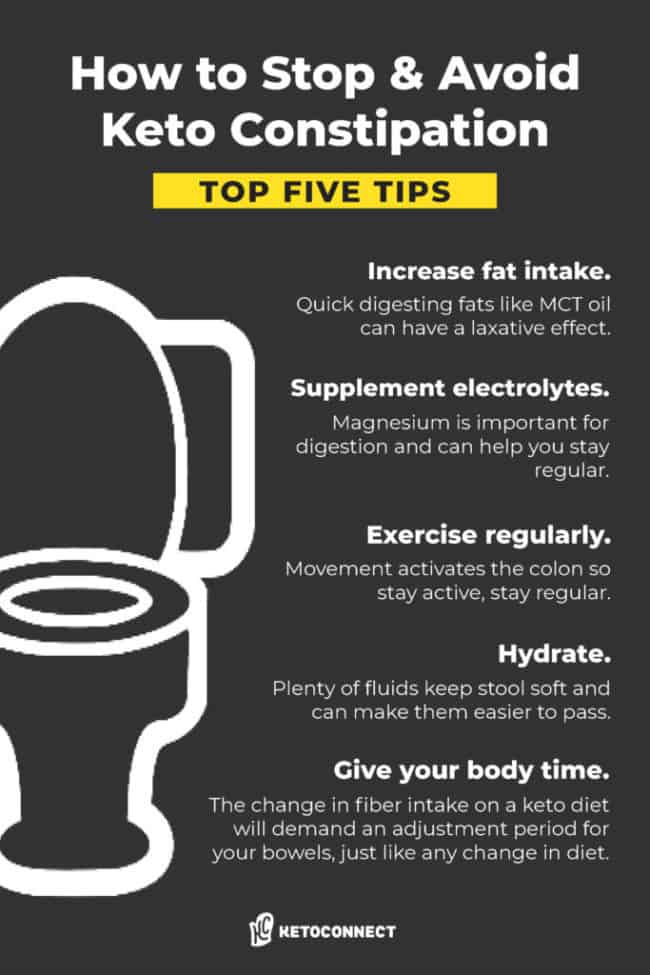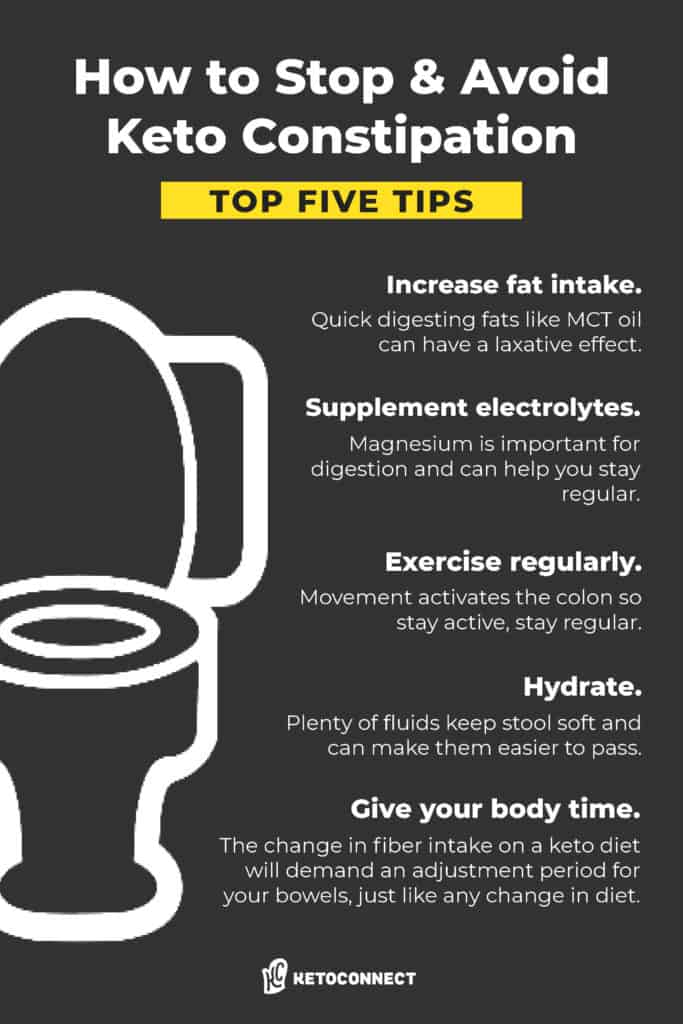If you’ve started a low carb diet, you might be noticing some unexpected changes—like constipation. It’s a common but frustrating side effect that can leave you feeling uncomfortable and unsure about how to fix it.
You’re not alone, and understanding why this happens is the first step to finding relief. You’ll learn what causes constipation on a low carb diet, how long it usually lasts, and simple strategies to keep your digestion smooth while sticking to your health goals.
Keep reading to take control of your gut health and enjoy the benefits of your low carb lifestyle without the hassle of constipation.
Causes Of Constipation On Low Carb
Constipation can become a common issue on a low carb diet. Many people face changes in their digestion after cutting carbs. Understanding the causes helps manage and prevent constipation effectively.
Low Fiber Intake
Low carb diets often reduce fiber-rich foods like bread and grains. Fiber helps keep stool soft and bowel movements regular. Without enough fiber, stool can become hard and difficult to pass.
Dehydration Effects
Drinking less water or losing fluids through increased protein metabolism can cause dehydration. The large intestine absorbs water from stool. When dehydrated, stool dries out and becomes hard, leading to constipation.
High Protein, Low Fiber Diets
Diets high in protein but low in fiber slow down digestion. Protein-rich foods often lack fiber, which is needed to move stool smoothly. This imbalance can cause bowel movements to become less frequent.
Fodmap Sensitivity
FODMAPs are natural sugars found in some vegetables and fruits. Some people on low carb diets eat more low-carb vegetables high in FODMAPs. This can cause digestive issues, including constipation, especially in sensitive individuals.
Dairy Consumption
Dairy products contain no fiber and may cause constipation for some people. Increased dairy intake on low carb diets can worsen bowel movements. Moderation and fiber-rich foods help balance digestion.
Medication Side Effects
Some medications cause constipation as a side effect. People on low carb diets may also take supplements like iron, which can harden stool. Awareness of medication effects helps in managing constipation better.
Underlying Health Conditions
Certain health problems like hypothyroidism or diabetes affect digestion. These conditions can slow bowel movements and cause constipation. Knowing health status is important when facing digestion issues on low carb diets.

Credit: www.ketoconnect.net
How Long Constipation Lasts
Constipation is a common issue on a low carb diet. It usually happens because many low carb foods have less fiber. The length of constipation varies from person to person. Most people notice improvement within a few days to weeks. Understanding how long constipation lasts helps you manage it better.
Adjustment Period
The body needs time to adapt to a low carb diet. During this phase, bowel movements may slow down. This adjustment period often lasts one to three weeks. Drinking more water can help soften stool. Adding fiber slowly also supports regular digestion. Physical activity encourages bowel movements too. Patience is key while your system adjusts.
When To Seek Help
If constipation lasts longer than three weeks, talk to a doctor. Severe pain, bleeding, or sudden changes in bowel habits need medical attention. Persistent constipation might signal underlying health issues. A doctor can check for problems and suggest treatments. Do not ignore symptoms that worsen or last too long.
Hydration And Constipation
Hydration plays a key role in managing constipation, especially on a low carb diet. Reducing carbs often lowers fiber intake, which can slow bowel movements. Drinking enough water helps keep stool soft and easier to pass. Without enough fluids, constipation may worsen and cause discomfort.
Water works with fiber to move waste smoothly through the digestive system. On a low carb diet, your body needs more water to balance the reduced carbs and fiber. Staying hydrated supports healthy digestion and regular bowel habits.
Importance Of Water
Water softens stool and prevents it from becoming hard. It helps the intestines push waste out efficiently. Without enough water, stool can become dry and difficult to pass. This leads to constipation and bloating. Drinking water also aids nutrient absorption and keeps your body functioning well.
On low carb diets, less carbohydrate intake means less water stored in the body. This increases the need for external hydration. Drinking enough water is essential to avoid constipation and maintain digestive health.
Tips For Staying Hydrated
Carry a water bottle to remind yourself to drink often. Set small goals like drinking a glass of water every hour. Eat water-rich foods such as cucumbers, lettuce, and celery. Avoid sugary drinks and caffeine, which can dehydrate you. Herbal teas and broth are good alternatives to plain water.
Track your water intake using apps or journals. Drink a glass of water before and after meals. These habits help keep your hydration consistent and support regular bowel movements on a low carb diet.

Credit: www.theprimal.com
Increasing Fiber Safely
Increasing fiber safely is key to easing constipation on a low carb diet. Fiber adds bulk to stool and helps it move through the intestines. Low carb diets often limit fiber intake, so careful adjustment is important. Sudden fiber increase can cause gas, bloating, or worsen constipation. A gradual, steady increase lets the digestive system adapt. Choose fiber sources that fit low carb goals to avoid excess carbs.
Gradual Fiber Increase
Start adding fiber slowly, about 2 to 3 grams each week. This prevents digestive discomfort and lets your body adjust. Track how you feel and stool changes during the process. Drink plenty of water to help fiber work well. Water softens stool and eases passage. Avoid raising fiber too fast to reduce risk of constipation or cramps. Patience is important to find the right fiber amount for your body.
Low-carb Fiber Sources
Focus on fiber-rich foods that are low in carbs. Vegetables like spinach, kale, and broccoli are good choices. Nuts and seeds, such as chia and flaxseeds, add fiber and healthy fats. Psyllium husk is a popular fiber supplement for low carb diets. It absorbs water and creates softer stools. Avoid high-carb fruits and grains that may disrupt your low carb plan. These options support fiber intake while keeping carbs in check.
Physical Activity Benefits
Physical activity plays a key role in easing constipation, especially on a low carb diet. Regular movement helps stimulate digestion and keeps your bowel movements regular. It also reduces bloating and discomfort caused by slow digestion.
Even mild exercise can boost the muscles in your intestines. These muscles push stool through your digestive tract more efficiently. Staying active supports a healthy gut and can prevent constipation from becoming a long-term issue.
Exercise And Bowel Movements
Exercise increases blood flow to your digestive system. This helps speed up the movement of waste through your intestines. Activities like walking, jogging, or cycling encourage regular bowel movements.
Physical activity also reduces stress, which often affects digestion. Stress can slow down your digestive system and cause constipation. Moving your body helps relax your mind and gut.
Simple Daily Activities
You don’t need intense workouts to help your digestion. Simple daily activities like stretching, house chores, or light walking are effective. These actions keep your body moving and support bowel health.
Try to avoid sitting for too long. Take short breaks to stand or walk around during the day. Small changes can make a big difference in preventing constipation on a low carb diet.
Meal Patterns To Improve Digestion
Meal patterns play a key role in easing digestion on a low carb diet. Adjusting how and when you eat can help reduce constipation. Simple changes improve gut movement and comfort.
Eating smaller meals more often and balancing nutrients supports regular bowel movements. These habits keep digestion smooth and prevent strain on the digestive system.
Smaller, Frequent Meals
Eating large meals can slow digestion and cause discomfort. Smaller portions spread throughout the day ease the workload on your gut. This approach helps food move smoothly through your intestines. It also prevents feelings of bloating and heaviness.
Try dividing your daily food intake into five or six small meals. This keeps your digestive system active and steady. It reduces the chances of constipation by avoiding long gaps between meals.
Balanced Nutrient Intake
Low carb diets often lack enough fiber, a key nutrient for digestion. Include fiber-rich vegetables like spinach, broccoli, and zucchini in your meals. Fiber adds bulk to stool and helps it pass easily.
Balance protein with healthy fats and fiber to support bowel health. Avoid too much protein without fiber, as it may slow digestion. Drinking enough water with meals also softens stool and aids movement.
Focus on a mix of nutrients each meal to keep digestion regular and avoid constipation. Variety and balance are essential for a healthy gut on a low carb diet.
Foods To Avoid Or Limit
Choosing the right foods is key to managing constipation on a low carb diet. Some foods can make constipation worse. Avoiding or limiting these can help keep your digestion smooth and regular.
High Fodmap Foods
High FODMAP foods contain certain sugars that some people cannot digest well. These foods may cause bloating, gas, and constipation. Examples include onions, garlic, cauliflower, and apples. Eating too many can upset your gut and slow digestion.
Excessive Dairy
Dairy products often lack fiber and can cause constipation for some people. Cheese, milk, and cream are common culprits. Try to limit dairy or choose lactose-free options. Including more fiber-rich foods helps balance your digestion.
Processed Low-carb Snacks
Many low-carb snacks are highly processed and low in fiber. These include protein bars and chips marketed as keto-friendly. They often contain additives and unhealthy fats. Relying on whole, natural foods supports better bowel movements.
When To Consult A Doctor
Constipation is a common issue on a low carb diet. Most people can manage it with simple changes. Sometimes, though, symptoms last longer or get worse. Knowing when to consult a doctor is important to avoid complications. This section explains key signs and reasons to seek medical advice.
Persistent Symptoms
Constipation lasting more than three weeks needs a doctor’s check. Severe pain, bloating, or bleeding are warning signs. If bowel movements stop completely or stools are very hard, medical help is necessary. Persistent symptoms may signal a deeper problem.
Potential Medical Causes
Some health conditions cause constipation regardless of diet. Thyroid problems, diabetes, and nerve disorders affect digestion. A doctor can run tests to find if these issues exist. Identifying medical causes helps target the right treatment.
Medication Review
Certain medicines can cause constipation as a side effect. Painkillers, antidepressants, and blood pressure drugs are common culprits. Tell your doctor about all medications and supplements you take. They might adjust doses or suggest alternatives to ease symptoms.

Credit: www.ketoconnect.net
Conclusion
Low carb diets often cause constipation due to low fiber intake. Drinking enough water helps soften stool and ease bowel movements. Gradually adding fiber-rich foods allows your body to adjust comfortably. Regular physical activity supports healthy digestion and prevents constipation.
Smaller, frequent meals can improve digestion and reduce discomfort. Persistent constipation needs medical advice to check for other causes. Managing diet and lifestyle changes can ease low carb constipation effectively. Stay patient; your body will adapt over time with proper care.


